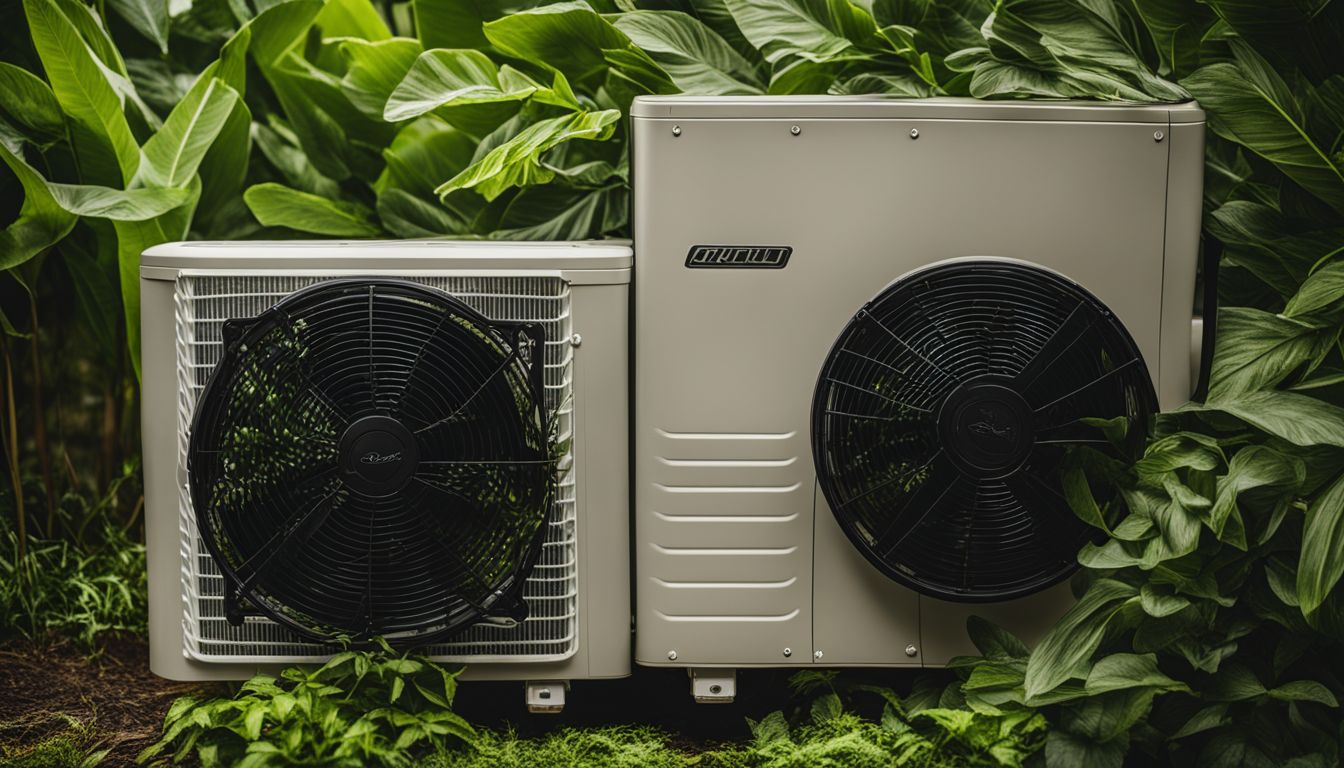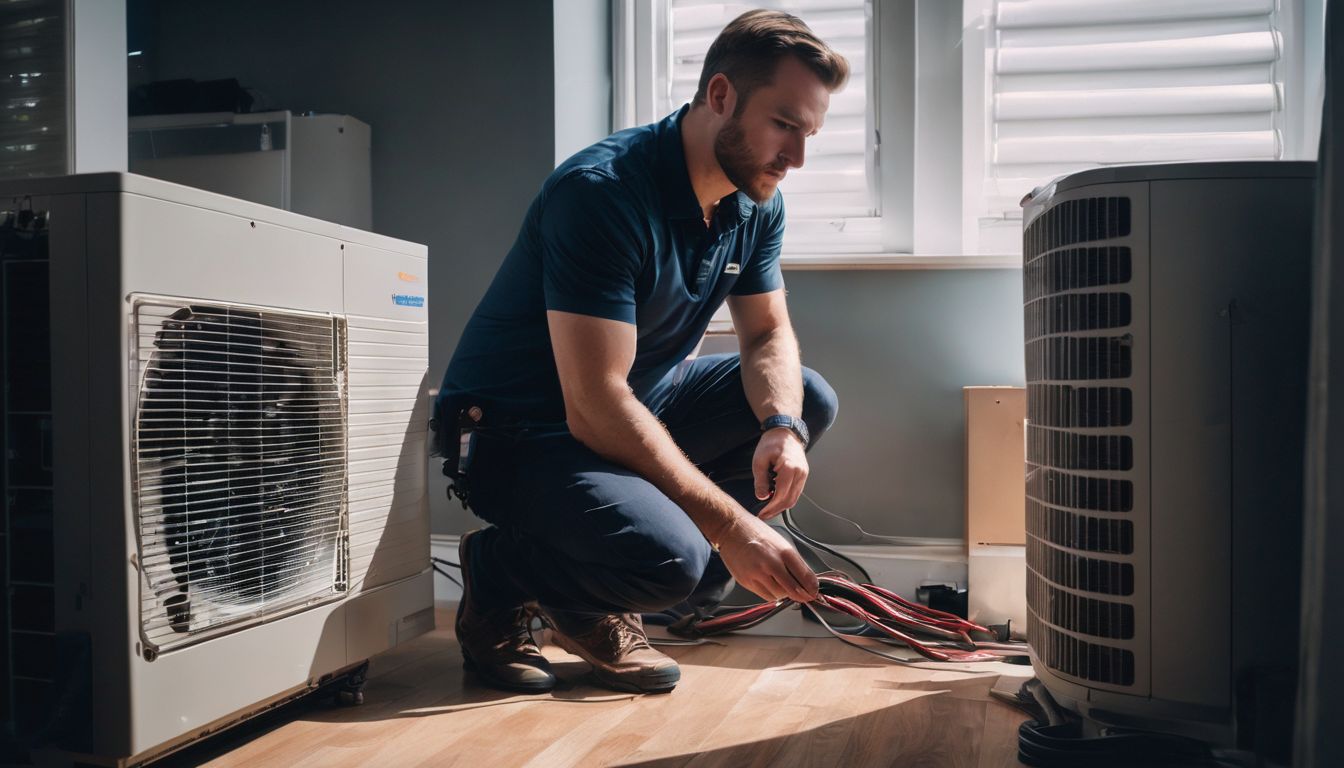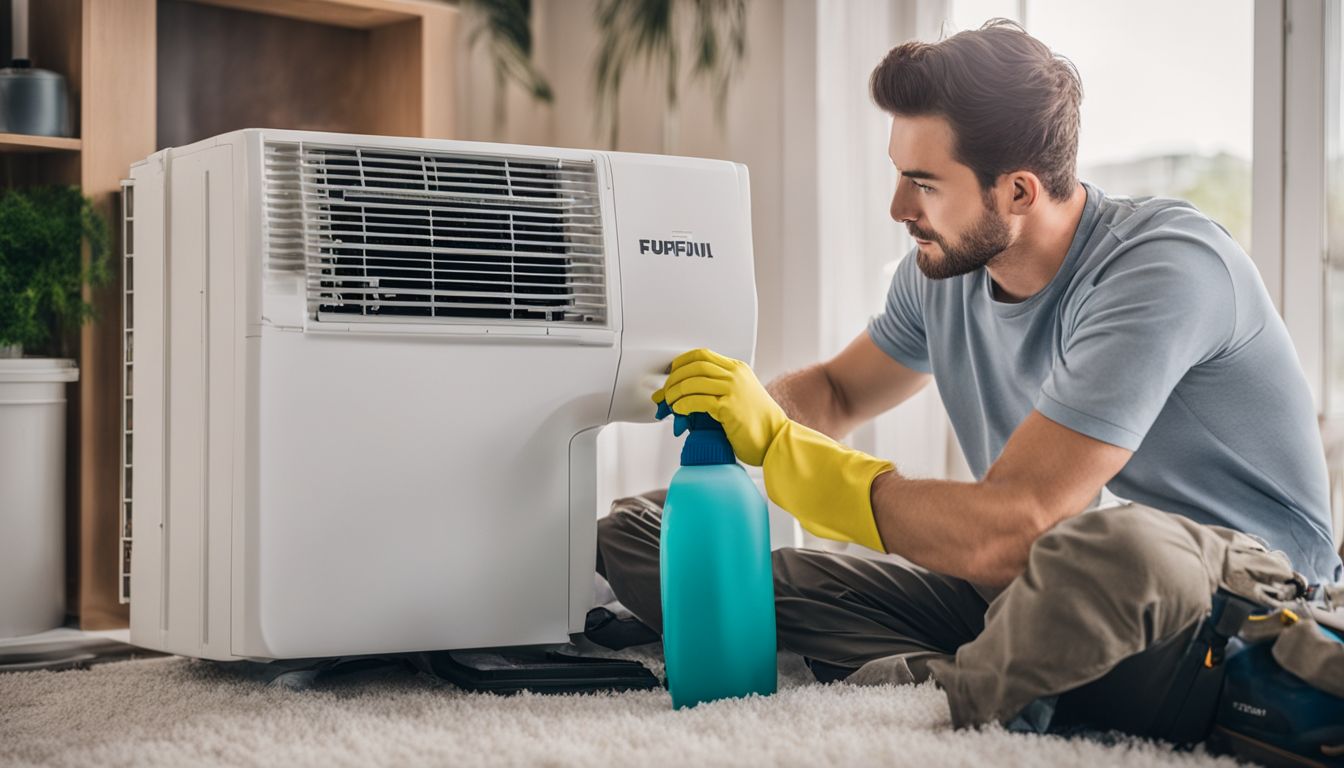Are you hearing strange noises coming from your air conditioner? Unexpected sounds can signal that something’s not quite right with your cooling system. This guide will break down the common culprits behind those odd hums and hisses, making it easier to pinpoint the issue.
Keep reading to find out what your aircon is trying to tell you!
Understanding Common Aircon Noises
Delve into the symphony of sounds your air conditioner may emit and learn what each distinct noise could be signalling about the health of your cooling system. From subtle humming to more pronounced rattles, we uncover the mysteries behind these auditory cues.
Humming

Humming sounds from your air conditioning unit often signal a problem with the fan motor or a faulty relay switch. This steady, low noise shouldn’t be ignored as it can indicate that parts of your HVAC system are under stress and may soon fail.
To prevent further issues, you should inspect the air conditioner’s components, focusing on the condenser fan blades and checking for any visible signs of wear or damage.
If you notice persistent humming even after visual checks, consider testing the relay switch’s health; this component is crucial for electrical flow within your air conditioning system.
A damaged relay could disrupt the efficient operation and lead to more extensive repairs if not addressed promptly. Regular maintenance helps catch these problems early, ensuring energy efficiency and prolonging the life span of your central air conditioning unit.
Duct noises
Duct noises can be quite unsettling and indicate different issues within your air conditioning system. If you hear rattling, it might mean that the metal ductwork has loosened over time, allowing sections to knock against each other when the airflow increases or decreases.
Popping sounds often arise from the ducts’ thermal expansion; as they heat up and cool down, these changes in temperature cause the material to expand and contract rapidly.
Booming noises usually come from larger sections of your HVAC system adjusting to pressure changes abruptly. Buzzing may signal electrical problems or a foreign object stuck in the fan blades.
It’s important for homeowners to pay attention to these sounds as they reflect what’s happening in their heating and cooling systems. Regular maintenance checks can prevent some of this noise by ensuring everything is tightly secured and functioning correctly in your air conditioner units and furnaces.
Rattling and popping
Rattling and popping noises from your air conditioner can interrupt a peaceful day. They often signal that something is amiss with the outdoor unit of your cooling system. If you hear these sounds, it could be due to a misaligned fan caused by debris or incorrect installation.
These disruptions need attention as they can impact the efficiency of your climate control.
Popping sounds sometimes come from thermal expansion within the air ducts. As metal ductwork heats up and cools down, it expands and contracts, leading to occasional pops that are more startling than harmful.
Regular checks on your air conditioning units might prevent these unsettling noises and ensure smooth operation without unexpected interruptions in comfort.
Booming
Booming sounds from your air conditioner often signal that the furnace is kicking in, attempting to ignite through a pilot light or an electronic ignition. This can be startling but it’s usually part of normal operation, especially during colder moments when the heater core gets into action.
Your heating and ventilation system works hard to maintain comfort and sometimes this process comes with its own soundtrack.
Keep an ear out for these deep booming noises as they indicate thermal activity within your HVAC unit. If you find them occurring frequently or becoming louder over time, it might suggest an issue with the thermostats or possibly a problem in how gas transitions from liquid to gaseous state due to thermostat valves functioning erratically.
Always consider regular checks on your central air conditioners’ patterns so that everything runs smoothly without unexpected interruptions.
Buzzing
Buzzing noises often point to issues within your air conditioning system. Loose parts, such as screws or a condenser coil that’s seen better days, can create this irritating sound.
Electrical problems are also common culprits behind the buzz. If you hear it from the outdoor unit, debris might be trapped inside, or something could have broken off and started vibrating against other components.
Regular checks can prevent buzzing from becoming a headache. Tighten any loose screws and clear away rubbish that might block your air conditioner’s parts. Keep an eye on the electrical connections too; they should stay secure to stop that distinct hum.
Call in reliable aircon services if the noise persists or worsens – they have the expertise to diagnose and fix more serious malfunctions like refrigerant leaks or faulty thermostatic expansion valves without delay.
Frequent Clicking
Hearing frequent clicking from your air conditioning system can be jarring and may signal that something isn’t quite right. This persistent sound often points to an electrical issue, such as problems with the relay or a defective control.
If components within the unit become loose—like a fan blade—it’s common for a clicking noise to develop. It’s important not to ignore these sounds because they can escalate into more serious issues if left unchecked.
Professional technicians have the tools and knowledge to pinpoint exactly what’s causing the click. They’ll check parts like thermostatic valves, condensing units, and other internal mechanisms of your aircon that could be responsible for the disturbance.
Quick action on your part by calling in experts ensures any small problem doesn’t evolve into a costly repair job or full system breakdown. Addressing frequent clicking promptly will help maintain the optimal function of your heating and air conditioning equipment while preserving the indoor air quality and sustainability of your system.
Whistling or squealing
Whistling or squealing sounds from your air conditioner can signal trouble. Often, these noises mean there could be leaks in the ductwork, where cool or warm air escapes before reaching its destination.
These leaks not only reduce efficiency but also create an annoying high-pitched sound that echoes through the home.
If you hear a sharp squeal, it’s possible a blower fan motor has been damaged. The damage can stem from regular wear and tear over time and may call for immediate attention. It’s crucial to switch off your air conditioning system right away if you notice this change in noise; letting it run could result in more extensive damage to the unit.
Hissing
Hissing sounds from an air conditioning system should never be ignored, as they often point to a refrigerant leak. Refrigerant is the lifeblood of your A/C system, and a hiss could signal it’s escaping.
Not only does this reduce efficiency, but it can also harm the environment and lead to costly repairs if left unaddressed. It’s important to act swiftly by calling in experts who can pinpoint the source of the hissing noise.
Leaks sometimes happen around areas with seals or valves and might come from either the indoor evaporator coil or other parts of your HVAC unit including thermal expansion valves or pipes.
In some cases, a hiss indicates that air is seeping through duct leaks, which compromises both your comfort and energy bills. Professional technicians use specialised tools to detect these issues accurately; ensuring that proper maintenance restores your system’s integrity and performance without delay.
Bubbling
Bubbling sounds coming from your air conditioning system can raise an alarm. This noise often suggests excess moisture lurks within the unit, potentially signalling troubles ahead.
If you hear this sound frequently, it could mean there’s a refrigerant leak in your air conditioner. The presence of such a leak requires immediate attention as it not only affects efficiency but may also compromise safety.
These gurgling or bubbling noises typically point to problems with the refrigerant line and are not something to ignore. Acting swiftly can prevent more serious damage to your heating, ventilation, and air-conditioning systems.
To resolve any issues associated with these noises, contacting professionals who understand automatic climate control and refrigeration systems is crucial for maintaining optimal performance and indoor air quality in your home or office space.
Causes of Aircon Noises
Delving into the reasons behind those disruptive sounds can illuminate the inner workings of your air conditioning system, revealing how simple wear and tear or more complex issues like component misalignment contribute to auditory disturbances.
Identifying these causes is crucial for maintaining a serene and well-functioning cooling environment in your space.
Mismatched air ducts
Mismatched air ducts in your air conditioning system can be behind those mysterious sounds you hear. If the ducts are not properly sized for your AC unit, they may lead to leaks or restrict airflow.
This results in a range of noises from whistling to banging as the pressure and flow of air are disrupted. Ensuring your AC’s ductwork is correctly matched can significantly reduce these unwanted sounds.
Leaks or blocks often accompany poorly fitted ducts, contributing further to the cacophony. Dampers may struggle to regulate air effectively through these mismatched passages, leading to an orchestra of groans and creaks every time your system kicks in.
Routine maintenance helps catch such issues early on, keeping your indoor air quality high and noise levels low.
Leaks or blocks in the ducts
Leaky ducts are often culprits behind strange hissing or gurgling sounds coming from your air conditioning system. These leaks can not only disrupt the efficiency of your unit but also compromise indoor air quality by letting in contaminants and unconditioned air.
If the installation isn’t done correctly, central air conditioners might suffer from these leaky ducts, resulting in low airflow and persistent noises that interrupt the quiet of your space.
Clogged vents add a different kind of trouble to the mix; they strain the AC’s capability to regulate temperatures effectively and hike up energy bills without mercy. Blocks halt cool air distribution throughout your home, creating uneven temperatures and putting unnecessary stress on your aircon’s motor – all while bumping up operational costs.
Regular checks can prevent such issues, ensuring that comfort and cost remain balanced in favour of an optimally functioning home environment.
Worn-out fan or motor bearings
Worn-out fan or motor bearings often lead to disturbing noises in your air conditioning system. These troublesome sounds range from screeching and squealing to less obvious grating noises.
Bad blower motor bearings are a common culprit behind the racket coming from the indoor unit of an air conditioner. Without adequate lubrication, these bearings deteriorate, causing your fan to protest loudly with every turn.
Dry fan motor bearings trigger similar concerns by producing a high-pitched squeal that’s hard to ignore. This annoying noise is a tell-tale sign that the moving parts within your AC are struggling to operate smoothly.
When loud squealing emanates from your AC compressor, it suggests serious wear and tear on either the fan motor or compressor motor bearings, signalling that maintenance can’t wait any longer.
Regular checks and proper greasing could prevent these components from grinding themselves down and creating unnerving symphonies in your living space.
Troubleshooting Aircon Noises
Discover practical steps to silence disruptive aircon sounds and enhance your system’s efficiency, delving deeper into the world of acoustic troubleshooting.
Solving Aircon Water Leaks: Causes and Solutions
Clogged drain lines often lead to troublesome water leaks in air conditioning systems. To tackle this, first check and clean the air filter since a dirty one can block airflow and cause coils to freeze and drip excess water.
If the problem persists, inspect the drain pan for damage; a cracked pan will need replacement to stop the leak. Sometimes condensate pumps break down, especially in humid conditions where they work overtime to expel water – ensuring they function properly is key.
Securing loose pipes promptly prevents further leakage issues within your system. It’s essential that all hoses are tightly fastened as part of regular maintenance checks; this simple step can save you from unexpected drips and puddles later on.
In cases where ice builds up on coils due to low refrigerant levels or lack of maintenance, it’s vital to address these causes immediately — replenishing refrigerant when needed or scheduling routine servicing can prevent freezing issues that lead to leaking.
When to Seek Professional Assistance
If your air conditioner starts making unusual sounds, such as hissing that suggests a refrigerant leak or booming indicating possible issues with the expansion joints, it’s time to call in skilled technicians.
Handling refrigerants requires expertise due to their hazardous nature and strict regulations. Experts trained by George Baral or WM Henderson come equipped with the right tools years of experience and knowledge about different AC systems, including room air conditioners and complex central units.
Situations like finding excess water around your unit may imply more than just a blocked drain; there could be problems extending to the radiator or washer components. In these cases, a thorough inspection from someone who understands the intricate details of air conditioning systems can save you time and money in the long run.
These professionals will ensure that all parts are functioning correctly and that indoor air quality is not compromised by any underlying issues within your system. Moreover, they often provide transparent pricing so you have clarity on repair costs upfront without any hidden surprises later on.
Conclusion
As you tackle the mysteries behind aircon noises, remember that identifying the sounds is your first step to a solution. Listen carefully and compare what you hear to our guide’s descriptions.
Take notes of any persistent or worsening noises, as these may be urgent signs needing attention. Always consider safety first and don’t hesitate to call in experts for complex issues.
Keep your cool; with this knowledge, you’re on track to quieter, more efficient air conditioning.
For a comprehensive understanding of how to tackle troubling water leaks, visit our detailed guide, Solving Aircon Water Leaks: Causes and Solutions.
FAQs
1. Why does my air conditioner make weird noises?
Your air conditioner might make strange noises due to parts like scroll compressors working hard or flash gas happening within your cooling system.
2. Can the sounds from my air conditioning affect indoor air quality?
No, the sounds themselves don’t impact indoor air quality, but if they signal a malfunction, this could eventually affect how clean your indoor air is.
3. Should I be worried about hissing sounds coming from my refrigerator or aircon unit?
Hissing noises may suggest a refrigerant leak in refrigerators or air conditioning systems; having a professional check it out is best.
4. Is it normal for my air conditioning system to make noise when starting up?
Some noise on startup is normal as the compressor and fans kick into gear, but a technician should check loud or unusual noises.





